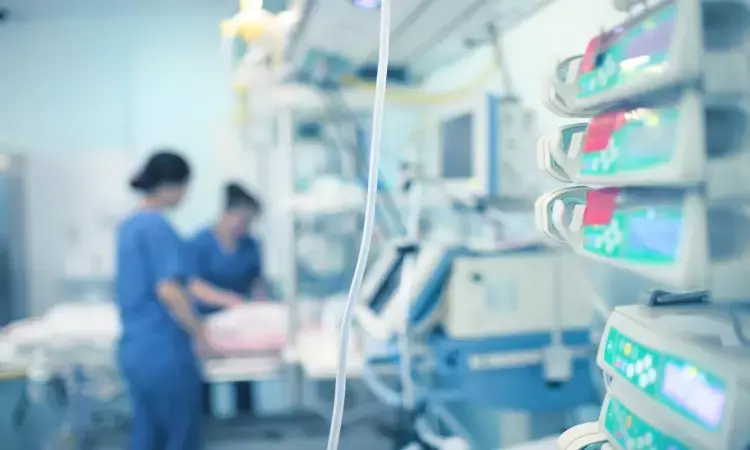- Home
- Medical news & Guidelines
- Anesthesiology
- Cardiology and CTVS
- Critical Care
- Dentistry
- Dermatology
- Diabetes and Endocrinology
- ENT
- Gastroenterology
- Medicine
- Nephrology
- Neurology
- Obstretics-Gynaecology
- Oncology
- Ophthalmology
- Orthopaedics
- Pediatrics-Neonatology
- Psychiatry
- Pulmonology
- Radiology
- Surgery
- Urology
- Laboratory Medicine
- Diet
- Nursing
- Paramedical
- Physiotherapy
- Health news
- Fact Check
- Bone Health Fact Check
- Brain Health Fact Check
- Cancer Related Fact Check
- Child Care Fact Check
- Dental and oral health fact check
- Diabetes and metabolic health fact check
- Diet and Nutrition Fact Check
- Eye and ENT Care Fact Check
- Fitness fact check
- Gut health fact check
- Heart health fact check
- Kidney health fact check
- Medical education fact check
- Men's health fact check
- Respiratory fact check
- Skin and hair care fact check
- Vaccine and Immunization fact check
- Women's health fact check
- AYUSH
- State News
- Andaman and Nicobar Islands
- Andhra Pradesh
- Arunachal Pradesh
- Assam
- Bihar
- Chandigarh
- Chattisgarh
- Dadra and Nagar Haveli
- Daman and Diu
- Delhi
- Goa
- Gujarat
- Haryana
- Himachal Pradesh
- Jammu & Kashmir
- Jharkhand
- Karnataka
- Kerala
- Ladakh
- Lakshadweep
- Madhya Pradesh
- Maharashtra
- Manipur
- Meghalaya
- Mizoram
- Nagaland
- Odisha
- Puducherry
- Punjab
- Rajasthan
- Sikkim
- Tamil Nadu
- Telangana
- Tripura
- Uttar Pradesh
- Uttrakhand
- West Bengal
- Medical Education
- Industry
Stress induced hyperphenylalaninemia tied to worse ICU prognosis

Taiwan: A new study published in Critical Care Medicine suggests that stress-induced hyperphenylalaninemia (SHP) in patients admitted to the ICU was associated with a poor prognosis.
Hyperphenylalaninemia predicts poor outcomes in patients with cardiovascular disease. However, the prognostic value and factors associated with stress-induced hyperphenylalaninemia remained unclear in critically ill patients in the cardiac intensive care unit. Chao-Hung Wang and his team, therefore, conducted this study to examine the prognostic value of stress hyperphenylalaninemia in critically ill patients presenting in cardiac intensive care units.
This was a prospective observational study in a cardiac intensive care unit at a center in Taiwan. Patients aged 20 years or older with an Acute Physiology and Chronic Health Assessment II score of 15 or greater and/or ventilator support in a cardiac intensive care unit were included in this study.
Plasma phenylalanine levels were measured continuously during the patient's stay in the ICU to examine its prognostic value for 90-day mortality. A Gene array was run to identify genetic polymorphisms associated with SHP and generate a genetic risk score (GRS). The association of SHP with clinical factors and genetic variation was analyzed and identified a correlation between pteridines and genetic variation.
The main results of this study were:
1. This study included 497 patients. Elevated phenylalanine concentrations were independently associated with increased mortality risk.
2. Patients with SHP had a higher risk of death compared with those without SHP.
3. SHP was associated with hepatic and renal dysfunction and genetic polymorphisms in the tetrahydrobiopterin (BH4) synthesis (CBR1 and AKR1C3) and recycling (PCBD2) pathways.
4. Higher GRS was associated with lower bioavailability of BH4 in response to stress.
5. Among patients without her SHP at baseline, those with a GRS ≥2 had a higher frequency of developing her SHP during their ICU stay and a higher risk of death compared with those with a GRS <2.
6. Genetic variants did not provide additional prognostic value in patients with SHP at baseline.
In conclusion, in patients without SHP, SHP-associated polymorphisms measured by a GRS of ≥2 were associated with subsequent increased risk of SHP and mortality. Integration of genetic screening, pteridine measurement, and phenylalanine monitoring offers an innovative way to assess critically ill patients, providing key information for precision medicine to improve critical care outcomes.
Reference:
Wang, C.-H., Chen, W.-S., Liu, M.-H., Lee, C.-Y., Wang, M.-Y., Liang, C.-Y., Chu, C.-M., Wu, H.-P., & Chen, W.-H. (2022). Stress Hyperphenylalaninemia Is Associated With Mortality in Cardiac ICU: Clinical Factors, Genetic Variants, and Pteridines. In Critical Care Medicine: Vol. Publish Ahead of Print. Ovid Technologies (Wolters Kluwer Health). https://doi.org/10.1097/ccm.0000000000005640
Neuroscience Masters graduate
Jacinthlyn Sylvia, a Neuroscience Master's graduate from Chennai has worked extensively in deciphering the neurobiology of cognition and motor control in aging. She also has spread-out exposure to Neurosurgery from her Bachelor’s. She is currently involved in active Neuro-Oncology research. She is an upcoming neuroscientist with a fiery passion for writing. Her news cover at Medical Dialogues feature recent discoveries and updates from the healthcare and biomedical research fields. She can be reached at editorial@medicaldialogues.in
Dr Kamal Kant Kohli-MBBS, DTCD- a chest specialist with more than 30 years of practice and a flair for writing clinical articles, Dr Kamal Kant Kohli joined Medical Dialogues as a Chief Editor of Medical News. Besides writing articles, as an editor, he proofreads and verifies all the medical content published on Medical Dialogues including those coming from journals, studies,medical conferences,guidelines etc. Email: drkohli@medicaldialogues.in. Contact no. 011-43720751


